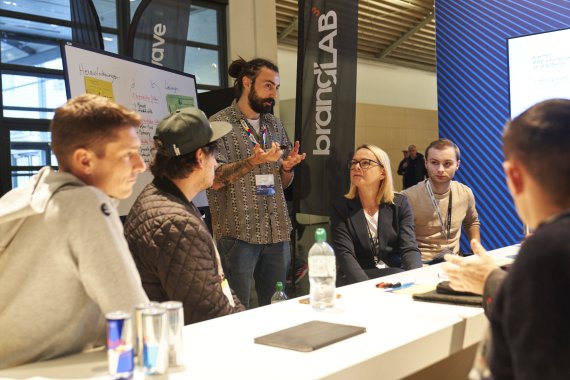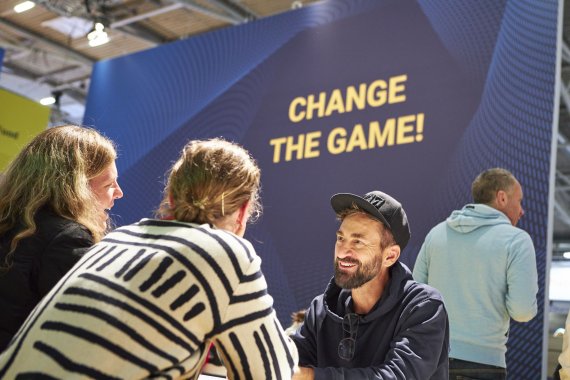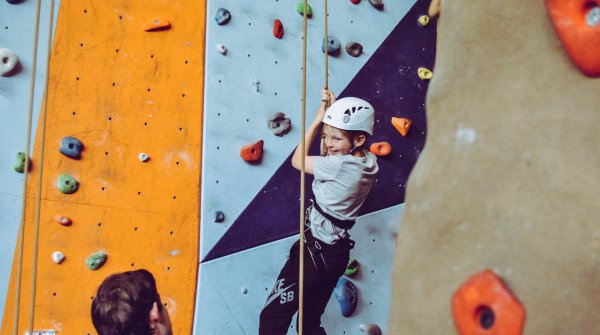6 hours, 41 minutes and 20 seconds - that's how much time a member of Gen Z, i.e. a person aged between 15 and 27, spends in front of various screens every day in Germany. This kind of digital behavior among young people leads to results like those announced by the World Health Organization (WHO) in its 2022 Global Status Report on Physical Activity: 81% of young people are currently not achieving the level of physical activity recommended by the WHO. A lack of physical activity can lead to extreme damage to health, which is already making itself felt in society today: Cardiovascular disease, diabetes, depression, dementia and other fatal health consequences are encouraged by too little exercise. If this trend does not change, the WHO estimates that the treatment of people suffering from physical inactivity will cost around 300 billion US dollars by 2030.
ISPO Munich premiere: GameChanger Sports Hub
Visitors to ISPO Munich were able to experience the GameChanger Sports Hub for the first time in 2023. The concept developed by Force of Disruption: to promote creative and digital innovations that get our society moving again. In addition to presentations on gamification in sport and debates on the topic of eSports, digital sports concepts could also be tested live on site. One highlight of the GameChanger program was the workshops in which industry experts worked together with young talent to develop creative solutions for the challenges facing the sports industry.
In a world characterized by modern conveniences and digital comforts, increasing inactivity is one of the key health challenges facing our society. Today's digital lifestyle increasingly favors sedentary activities - whether at work, while commuting or during leisure time. This comfortable but increasingly inactive lifestyle has far-reaching consequences for our physical and mental health.
How can we learn to live healthily in a digitalized world? Can we even use digitalization to become healthier again as a society? The participants of the hackathon in the GameChanger Sports Hubs at ISPO Munich 2023 asked themselves these questions.
It quickly became clear that integrating exercise into everyday life is crucial for a sustainable change towards a more active lifestyle. Modern technologies not only offer innovative solutions for this, but also the opportunity to motivate people in new ways. Digital technologies such as wearables, fitness apps, virtual reality, online communities, challenge platforms and social media can serve as tools to make our daily routines more activity-friendly. Digitalization thus opens up a way to inspire people to lead an active lifestyle again and positively influence their health.
The participants in the "Digitalization in sport" workshop ultimately developed five demands for the industry to get more people moving again.
1. build and promote digital education approaches
Promoting physical activity requires not only the provision of technology, but also comprehensive education and information on how to use it. Combining technology with analog educational activities, such as physical education in schools, can pick up young sedentary people where they are every day. The combination of technology and education thus creates a basis for long-term changes in behavior.
2 ESG criteria for digitalization
For some institutions in the sports industry, such as smaller clubs, the digitalization of their services can result in high costs that threaten their existence. Yet they are an essential part of our society and therefore also of sport. The workshop participants therefore propose the development of an "ESG-like criterion" for digitalization in sport in order to ensure more financial support in this important area.
3. digital approaches for more inclusion and fewer barriers to entry
Many people lack access to a sport that really excites them. Digitalization can help to remove any barriers to entry: Virtual reality (VR) and augmented reality (AR) can be used to realistically simulate sports, facilitate contact with communities or create new environmental events. Virtual environments allow people to move around in fascinating landscapes or take part in interactive fitness classes without leaving home. These immersive experiences merge exercise and entertainment, helping to overcome barriers to accessing fitness activities.
4 Gamification as a motivational approach
The integration of playful elements, also known as gamification, has proven to be a successful method of motivating people to exercise. Fitness apps and platforms use reward systems, challenges and virtual badges to integrate a playful element into everyday activity. The idea of presenting physical activity as a fun challenge can appeal to different age groups and promote a positive attitude towards exercise.
5. sustainable modernization of the industry
The participants of the "Digitalization in sport" workshop recognize the urgent need for a sustainable modernization of the sports industry. In view of the current challenges and changing social demands, the sports industry must take on a pioneering role in terms of sustainability and future-oriented technologies. This means expanding digital technologies such as smart technologies, data-driven analysis and artificial intelligence to ensure more efficient processes and promote social responsibility, transparency and education.
However, even people who want to actively participate in sport sometimes face problems. The number of sports clubs in Germany has been in constant decline for over ten years, and the provision of sports for young people is particularly at risk in rural areas. In another workshop, the participants therefore looked at German club life together with two experts, which has been confronted with a variety of problems since the coronavirus pandemic at the latest: rising energy costs, inflation, fewer volunteers, generational change, consolidation of the sports landscape into a few large clubs in urban areas, etc.
While gyms and other commercial sports providers attract young people with glitzy social media campaigns and influencers, many traditional sports clubs struggle with media attention. Their online presence is often sparse and their messages go unheard in the digital desert. The challenge of reinventing themselves and meeting the younger generation where they are can become a matter of survival for these sports clubs.

The participants in the workshop developed solutions to the challenges mentioned above and put them into a four-point plan:
1. promote club culture
Making club work more attractive to young people by presenting it not just as an obligation, but as an opportunity for personal and community development. With financial incentives, recognition and a strong sense of community, young people are encouraged to volunteer. This fresh approach transforms the traditional image of volunteering into a vibrant and rewarding commitment that attracts young talent and secures the future of clubs.
2. modernize communication
Club influencers become the new faces and voices that carry the sports club into the future. Dedicated young people are bringing a breath of fresh air to the online presence of clubs, using Instagram, TikTok and other platforms to tell authentic, lively stories about club life. With their enthusiasm and creativity, they transform clubs into dynamic, digital communities that reach far beyond the boundaries of the sports field.
3. improvement of internal factors
A nationwide digital platform that connects all sports associations and clubs. This innovation simplifies bureaucratic processes and makes funding applications more accessible. It opens up a new era of efficiency and consistency, where information and resources flow seamlessly. This digital hub is not only an administrative tool, but also a symbol of the modern and connected future of sport.
4. improving external factors
Increased financial support for grassroots sport sends a clear signal of the systemic relevance of sports clubs. At the same time, club structures and processes are being optimized to create modern, efficient and inclusive workflows. These reforms aim to adapt clubs to modern society, facilitate generational change and usher in a new era of sports club culture.

In view of the shared conviction and strong commitment of all workshop participants at the GameChanger Hackathon to a sustainable modernization of the sports industry, the demands developed are intended to encourage sports organizations, clubs and event organizers to work together to pave the way for an innovative and socially responsible sports industry.
- Awards
- Mountain sports
- Bike
- Fitness
- Health
- ISPO Munich
- Running
- Brands
- Sustainability
- Olympia
- OutDoor
- Promotion
- Sports Business
- Textrends
- Triathlon
- Water sports
- Winter sports
- eSports
- SportsTech
- OutDoor by ISPO
- Heroes
- Transformation
- Sport Fashion
- Urban Culture
- Challenges of a CEO
- Trade fairs
- Sports
- Find the Balance
- Product reviews
- Newsletter Exclusive Area
- Magazine










